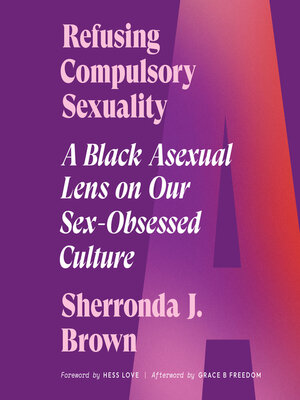Refusing Compulsory Sexuality
audiobook (Unabridged) ∣ A Black Asexual Lens on Our Sex-Obsessed Culture
By Sherronda J. Brown

Sign up to save your library
With an OverDrive account, you can save your favorite libraries for at-a-glance information about availability. Find out more about OverDrive accounts.
Find this title in Libby, the library reading app by OverDrive.



Search for a digital library with this title
Title found at these libraries:
| Loading... |
For readers of Ace and Belly of the Beast: A Black queer feminist exploration of asexuality—and an incisive interrogation of the sex-obsessed culture that invisibilizes and ignores asexual and A-spec identity.
Everything you know about sex and asexuality is (probably) wrong.
The notion that everyone wants sex—and that we all have to have it—is false. It’s intertwined with our ideas about capitalism, race, gender, and queerness. And it impacts the most marginalized among us. For asexual folks, it means that ace and A-spec identity is often defined by a queerness that’s not queer enough, seen through a lens of perceived lack: lack of pleasure, connection, joy, maturity, and even humanity.
In this exploration of what it means to be Black and asexual in America today, Sherronda J. Brown offers new perspectives on asexuality. She takes an incisive look at how anti-Blackness, white supremacy, patriarchy, heteronormativity, and capitalism enact harm against asexual people, contextualizing acephobia within a racial framework in the first book of its kind. Brown advocates for the “A” in LGBTQIA+, affirming that to be asexual is to be queer—despite the gatekeeping and denial that often says otherwise.
With chapters on desire, f*ckability, utility, refusal, and possibilities, Refusing Compulsory Sexuality discusses topics of deep relevance to ace and a-spec communities. It centers the Black asexual experience—and demands visibility in a world that pathologizes and denies asexuality, denigrates queerness, and specifically sexualizes Black people.
A necessary and unapologetic reclamation, Refusing Compulsory Sexuality is smart, timely, and an essential read for asexuals, aromantics, queer readers, and anyone looking to better understand sexual politics in America.
Everything you know about sex and asexuality is (probably) wrong.
The notion that everyone wants sex—and that we all have to have it—is false. It’s intertwined with our ideas about capitalism, race, gender, and queerness. And it impacts the most marginalized among us. For asexual folks, it means that ace and A-spec identity is often defined by a queerness that’s not queer enough, seen through a lens of perceived lack: lack of pleasure, connection, joy, maturity, and even humanity.
In this exploration of what it means to be Black and asexual in America today, Sherronda J. Brown offers new perspectives on asexuality. She takes an incisive look at how anti-Blackness, white supremacy, patriarchy, heteronormativity, and capitalism enact harm against asexual people, contextualizing acephobia within a racial framework in the first book of its kind. Brown advocates for the “A” in LGBTQIA+, affirming that to be asexual is to be queer—despite the gatekeeping and denial that often says otherwise.
With chapters on desire, f*ckability, utility, refusal, and possibilities, Refusing Compulsory Sexuality discusses topics of deep relevance to ace and a-spec communities. It centers the Black asexual experience—and demands visibility in a world that pathologizes and denies asexuality, denigrates queerness, and specifically sexualizes Black people.
A necessary and unapologetic reclamation, Refusing Compulsory Sexuality is smart, timely, and an essential read for asexuals, aromantics, queer readers, and anyone looking to better understand sexual politics in America.






